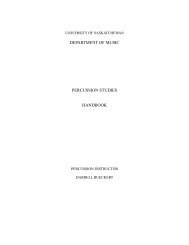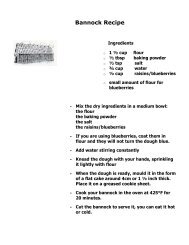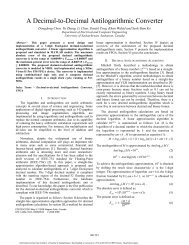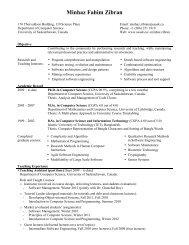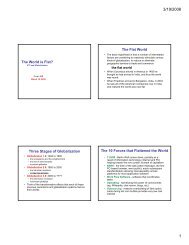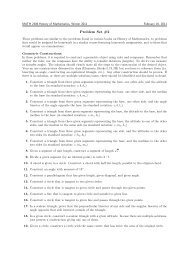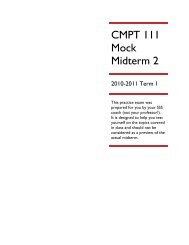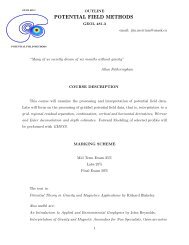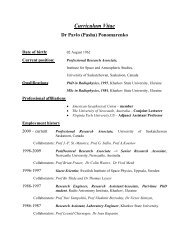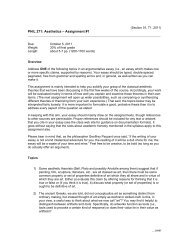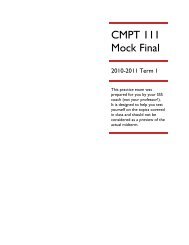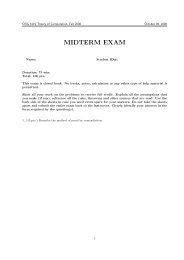Water Resources Engineering - Homepage Usask
Water Resources Engineering - Homepage Usask
Water Resources Engineering - Homepage Usask
Create successful ePaper yourself
Turn your PDF publications into a flip-book with our unique Google optimized e-Paper software.
G13. MONITORING OF WATER QUALITY<br />
(KUL-code: GM24 (Th); GM25 (Pr))<br />
Lecturer: OLLEVIER F. / BRENDONCK L.<br />
ECTS-credit: 5 pts<br />
Contact hours: 30 hrs. of theory/30 hrs. of practical<br />
Prerequisites: Basic knowledge of aquatic ecology, hydrology, microbiology, biochemistry, organic<br />
and inorganic chemistry<br />
Time and place: 1 st semester, VUB<br />
Course syllabus: Lecture notes<br />
Evaluation: Quotation on a personal work (case study) and an oral exam with written preparation<br />
Comparable handbook: <strong>Water</strong> quality monitoring, Eds. J. Bartram & R. Ballance, E&FN SPON (Chapman and<br />
Hall), London, 1996, ISBN 0-419-21730-4<br />
<strong>Water</strong> quality assessments, Ed. D. Chapman E&FN SPON (Chapman and Hall),<br />
London, 1996, ISBN 0-419-21590-5<br />
Principles of ecotoxicology, second edition, Eds. C.H. Walker, S.P. Hopkin, R.M.<br />
Sibly, D.B. Peakall, Taylor and Francis, London, 2001, ISBN 0-7484-0940-8<br />
Additional information: -<br />
Learning objectives:<br />
The course aims at providing an in-depth knowledge of physical-chemical and biological methods for<br />
monitoring water quality, to provide the students with the necessary tools for the design of a purpose-oriented<br />
monitoring programme. Basic knowledge of the structure and function (e.g. courses C9- Aquatic Ecology and<br />
G14- Advanced Aquatic Ecology) and the hydrological characteristics (e.g. courses C6-7- surface and<br />
groundwater hydrology; courses G7-8- surface and groundwater modeling) of aquatic ecosystems is integrated<br />
for the proper interpretation of water quality data, to predict the impact of pollution on the natural environment<br />
and for water resource management. Special attention is given to the interdisciplinary character of<br />
ecotoxicological research and monitoring programmes and to the need for an integration of the monitoring data<br />
with the physical, hydrological and ecological characteristics of the catchment area and the various transport,<br />
transformation, degradation and accumulation pathways that lead to the observed distribution patterns of<br />
pollutants in the water and in organisms. Special emphasis is given to implementing monitoring programmes in<br />
remote areas and in developing countries taking into consideration any practical limitations (e.g. financial<br />
resources). As such the students will also get a good feeling of the vulnerability of the aquatic systems and the<br />
need for working out a realistic and well budgeted monitoring and management scheme in relation to any<br />
economical developments in the area considered. By this integration of monitoring and management strategies<br />
in an ecological and sociological context, several of the IUPWARE learning points are met.<br />
Course description:<br />
A) General:<br />
- Introduction to pollution: types of physical-chemical pollution of surface and groundwater; effects of<br />
contamination of water with pathogenic bacteria and viruses; effects of pollution and eutrophication on the<br />
ecology of streams, lakes, reservoirs, estuaries and marine waters;<br />
- Introduction to ecotoxicology: impact of environmental conditions on the toxicity of compounds;<br />
introduction to the criteria for the evaluation of toxicity (LC50, EC50, NOEC, MATC); biological<br />
transformation, biodegradation and bio-accumulation of compounds; advantages and shortcomings of singlespecies<br />
tests and tests using community or ecosystem responses; and<br />
- Critical evaluation of merits and problems with physical-chemical and biological monitoring;<br />
B) Physical-chemical monitoring:<br />
- Measuring physical properties of water;<br />
- Analysis of chemical properties of water;<br />
- <strong>Water</strong> quality assessment: water quality criteria, norms, water quality indices; and<br />
- Sampling strategies and techniques for physical-chemical monitoring of water quality;<br />
C) Biological and microbiological monitoring:<br />
44 / Course syllabi



